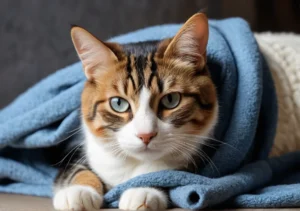Cats are known for their quirky behaviors, from kneading blankets to giving unexpected nips. But why do they engage in these seemingly strange actions? Let’s uncover the reasons behind why cats bite and massage blankets.
When cats bite and massage blankets, it’s often a display of instinctual behaviors that harken back to their days in the wild. These actions can serve various purposes, from marking territory to seeking comfort and security. Let’s explore the fascinating reasons behind these common feline behaviors.
Understanding Feline Instincts
Cats are fascinating creatures with a rich history of hunting and survival. One of the most intriguing behaviors they exhibit is biting and massaging blankets. This behavior can be traced back to their early days as kittens, where they kneaded their mother’s belly to stimulate milk flow. Kneading, as it’s commonly known, is a soothing behavior that cats retain into adulthood. When cats bite and massage blankets, it’s a way for them to release pent-up energy and express contentment.
Another reason behind this behavior lies in cats’ instincts to mark their territory. By biting and massaging blankets, cats are leaving behind their scent, claiming the item as their own. This behavior can be especially common in multi-cat households where cats may feel the need to assert their presence. It’s important to remember that this behavior is natural for cats and shouldn’t be discouraged, as it helps them feel secure and comfortable in their environment.
Seeking Comfort and Security
Cats are creatures of comfort, seeking out warm and cozy spots to rest and relax. So, it’s no surprise that they turn to blankets for comfort and security. When cats bite and massage blankets, they are recreating the feeling of being nestled against their mother’s warm fur as kittens. This behavior provides them with a sense of security and contentment in their surroundings.
In addition to seeking comfort, cats also use blankets and other items for stress relief. Just like humans may squeeze a stress ball or fidget with an object, cats may bite and massage blankets as a way to cope with anxiety or boredom. Providing your cat with plenty of enrichment and playtime can help reduce the need for this behavior. Interactive toys and scratching posts can offer an outlet for their energy and help keep them mentally stimulated.
Whether your cat is kneading, biting, or massaging blankets, it’s essential to understand that these behaviors are rooted in their natural instincts and need for comfort. By providing a safe and stimulating environment, you can help your feline friend feel secure and content in their home.
Territory Marking
Cats are territorial creatures by nature, and they have some interesting ways of marking their territory. When your feline friend bites and kneads blankets, they’re actually using scent glands in their paw pads and mouth to leave behind their unique scent. It’s like them saying, “Hey, this blanket is mine!” So, next time you see your cat getting cozy and starting to nibble on a blanket, just know they’re claiming it as their own little kingdom.
Stress and Anxiety Relief
Just like humans, cats can experience stress and anxiety too. When your cat bites and massages blankets, it can actually be a way for them to relieve some of that pent-up tension. It’s like their version of a stress ball or a cozy hug. So, if you notice your furry companion engaging in this behavior, try to create a calming environment for them and provide plenty of opportunities for relaxation and play to help alleviate their stress.
- Provide a cozy cat bed or safe hiding spots for your cat to retreat to when they need a break.
- Engage your cat in regular play sessions to help them burn off excess energy and reduce stress.
- Consider using pheromone diffusers or calming sprays to create a soothing atmosphere for your cat.
- Make sure your cat has access to fresh water, nutritious food, and a clean litter box to support their overall well-being.
Remember, understanding why your cat exhibits certain behaviors can help strengthen your bond and create a harmonious living environment for both you and your feline companion.
Play and Predatory Instincts
Cats biting and massaging blankets are often rooted in their play and predatory instincts. These behaviors mimic attacking and kneading movements that kittens would display when engaging with their littermates or preparing prey. By biting and kneading blankets, cats hone their hunting skills, even in the safety of a domestic environment. It’s their way of staying sharp and satisfying their natural instincts.
Providing Enrichment and Stimulation
To cater to your cat’s need for enrichment and stimulation, offer appropriate outlets for their biting and massaging behaviors. Provide interactive toys that encourage pouncing and swatting, stimulating their mental and physical well-being. Additionally, consider introducing scratching posts or puzzle feeders to engage their hunting instincts in a positive and constructive manner. By offering these outlets, you can help your feline friend stay mentally and physically active while preventing them from redirecting their behaviors onto less desirable items in your home.
- Rotate Toys: Keep your cat engaged by rotating their toys regularly. This helps prevent boredom and ensures they have a variety of stimulating options to choose from.
- Vertical Space: Create vertical spaces for your cat to climb and explore, satisfying their natural urge to perch and observe their surroundings.
- Hide and Seek: Hide treats or toys around your home to encourage your cat to hunt and engage their natural predatory instincts.
- Outdoor Enclosure: If possible, provide a safe outdoor enclosure or window perch for your cat to observe the outside world and stimulate their senses.
By understanding the reasons behind your cat’s biting and massaging behaviors, and offering appropriate outlets for their instincts, you can create a stimulating environment that caters to their natural inclinations.
Redirecting Destructive Behaviors
Understanding why cats bite and massage blankets can help us redirect these behaviors towards more appropriate toys and activities. Cats engage in these actions for various reasons, such as marking their territory, instinctual hunting behaviors, or simply seeking comfort. To prevent damage to your blankets and furniture, provide plenty of interactive toys for your cat to play with. Rotate toys regularly to keep your feline friend engaged and satisfied, and ensure they have scratching posts to fulfill their natural urge to scratch and knead. Consider using catnip-infused toys to attract your cat’s attention and redirect their biting and massaging behaviors away from your blankets.
Living Harmoniously with Your Feline Friend
To live harmoniously with a cat who bites and massages blankets, create a comfortable and stress-free environment that addresses their natural instincts. Provide soft and cozy blankets specifically designated for their use, encouraging them to engage in these behaviors without causing damage to your belongings. Additionally, establish a routine that includes playtime and bonding activities to strengthen your bond with your cat and alleviate any stress or anxiety that may be causing these behaviors. Remember that patience and positive reinforcement are key to fostering a happy and healthy relationship with your feline companion.
- Create a cozy and inviting space for your cat to relax and unwind.
- Offer a variety of textures for them to knead and massage, such as soft blankets, pillows, and plush toys.
- Engage in interactive play sessions with your cat regularly to provide mental stimulation and physical exercise.
- Consult with a veterinarian or animal behaviorist if biting and massaging behaviors become excessive or destructive.
By incorporating these tips into your daily routine, you can ensure a harmonious coexistence with your cat while understanding and respecting their natural instincts. Providing a supportive and enriching environment will not only benefit your feline friend but also strengthen the bond you share.
Alex, a passionate animal lover, has experience in training and understanding animal behavior. As a proud pet parent to two dogs and three cats, he founded AnimalReport.net to share insights from animal experts and expand his knowledge of the animal kingdom.




